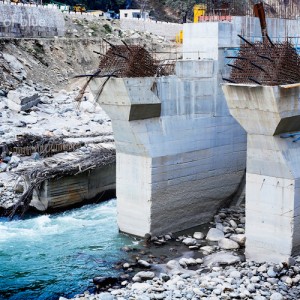Third Time’s Not A Charm: U.S. Supreme Court Again Denies Request to Stop Asian Carp
The Supreme Court denied a request by five states that were calling for immediate action to stop invasive Asian carp from infiltrating the Great Lakes. This is the third time that the court has denied an injunction for the Asian carp case.
By Codi Yeager
Circle of Blue
On Monday, the U.S. Supreme Court refused a petition from Michigan, Ohio, Pennsylvania, Wisconsin, and Minnesota. The petition had asked that the court order further action by the U.S. Army Corps of Engineers to stop Asian carp from reaching the Great Lakes. If granted, the injunction would have required the placement of preventative nets in the Grand Calumet and Little Calumet rivers in Chicago. It would also have forced the Corps of Engineers to speed up its study — which is currently scheduled for completion in 2015 — on ways to permanently keep Asian carp and other invasive species out of the watershed.
This is the third time that the court has denied an injunction for the Asian carp case. A lawsuit between the states and the Corps of Engineers and the Chicago Water District is still pending in federal district court.
“The decision is disappointing but not unexpected.”
–Dana Brueck, communications officer
Wisconsin Department of Justice
Despite the Supreme Court denial, Great Lakes states are pursuing several other avenues to stop the carp.
“This is not the end of anything,” Nils Frederiksen, spokesman for the Pennsylvania Office of Attorney General, told Circle of Blue. “The underlying legal case goes on, the cooperative efforts by the states go on, the work by the U.S. Army Corps of Engineers goes on. The Supreme Court decision to deny cert (writ of certiorari) doesn’t end this case.”
Frederiksen added that the decision was not surprising because of the pending district court case, a sentiment echoed by Dana Brueck, communications officer for the Wisconsin Department of Justice. “The decision is disappointing but not unexpected. Wisconsin and its partner Great Lakes states now will press forward to litigate the merits of the case, including seeking a permanent remedy to keep Asian carp out of the Great Lakes,” Brueck wrote in a statement to Circle of Blue.
Asian carp are a Eurasian fish that escaped aquaculture facilities in the southern United States in the 1970s. Since then, they have spread throughout the Mississippi River Basin, reaching the proximity of Chicago, which some say is the gateway to the Great Lakes watershed, where they could wreak havoc on the $US 7 billion sport-fishing industry by out-competing native species. Carp DNA has been detected in Chicago-area waterways, and one bighead carp was found on the Lake Michigan side of an electric barrier that is meant to keep the fish out.
“This is not the end of anything. The underlying legal case goes on, the cooperative efforts by the states go on…We are still working with the other states to develop a permanent solution.”
— Nils Frederiksen, spokesman
Pennsylvania Office of Attorney General
The fish can be transported a number of ways, however, and there is still debate about how imminent the Asian carp threat is for the Great Lakes, as is demonstrated by the ongoing discussion throughout the various levels of U.S. court systems.
In the meantime, further cooperation between the parties involved will help keep the fish at bay.
“All of the parties, including the Corps of Engineers, have acknowledged that this is a serious issue,” Frederiksen said. “We are still working with the other states to develop a permanent solution — sooner rather than later — because, if the Asian Carp do get into the Great Lakes, there is no undoing that.”
The federal government is also aiding the battle against the carp. Last week, the Obama administration promised $US 51.5 million for water testing, netting, and other measures to prevent the fish from reaching the Great Lakes. Legislators from Michigan introduced the Stop Asian Carp Act in both the Senate and House of Representatives in 2011, and the bills are currently pending congressional committee review.
A news correspondent for Circle of Blue based out of Hawaii. She writes The Stream, Circle of Blue’s daily digest of international water news trends. Her interests include food security, ecology and the Great Lakes.
Contact Codi Kozacek







Going back to the Supreme Court was nothing more than a Political Carp Grandstanding Stunt.
Michigan’s Attorney General has stated on several occasions that this strategy would go nowhere in the Supreme Court. And yet, he continues to pursue this strategy in an attempt to impress the folks back home and convince the uninformed that he is fighting to “Save Michigan’s way of life.” That’s just “Pure Michigan” CarpolaCrapola.
At this point, all the State of Michigan is doing is creating an adversarial relationship with those actually protecting the Great Lakes and working to resolve the Asian carp issue. The truth is that the State of Michigan has become part of the Asian carp problem, rather than part of the solution.
It is a well known fact that hydrological separation using physical barriers, such as closing locks or constructing land bridges or dams, does not stop invasive species migration. In fact, Asian carp have been found in lakes and rivers throughout the Midwest that are already completely isolated by substantial land bridges, dams, and closed locks.
The only effective way to deal with Asian carp is through population control. In fact, population control has been the only successful strategy by which invasive species have been controlled in the Great Lakes and other aquatic systems.
Severing a strategic commercial and recreational waterway serving two vital economic regions of the country would be ineffective, prohibitively expensive, irresponsible, and incredibly stupid.
It’s no wonder the Supreme Court wants no part of it.